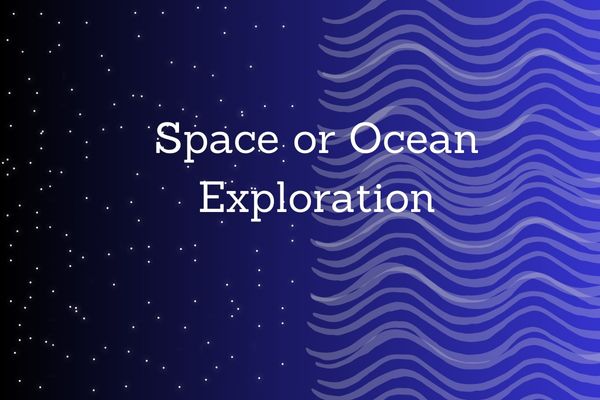For years, space has been a symbol of scientific and technological advancement and has always been a symbol of exploration. During the Space Race, it was nicknamed the ‘last frontier’. But recently, people have begun shifting their attention to ocean exploration. After all, the ocean takes up 71% of the Earth’s surface and we have explored less than ten percent of it. As newer generations begin to gain power, there has been an increase in support for ocean exploration rather than space.
A research poll was conducted at MIA to assess where students feel exploration should take place the most. Just over 77% of students agreed that ocean exploration would be more beneficial while 23% said space exploration would be. This pool of high school students will become the taxpayers within the next few years, meaning public opinion on exploration is going to shift.
Students in the poll also favored domestic financial projects rather than exploration funding, with 71% saying that the United States should pay more attention to the situation at home. This is also understandable as this matches changing opinions of newer generations. It is much more common for Millenials, Gen-Z, and even some of Gen-X to urge the government to focus on domestic issues such as infrastructure, the wage gap, and limiting discrimination.
Polls do a relatively good job at assessing the public opinions; they are typically done to determine public opinion and can be used to predict opinions and outcomes in the future. Reading results from polls like these can help determine public opinion. Public opinion is powerful because our government is a representative democracy. This means that citizens elect officials who represent their ideologies to vote for legislation to be made and passed.
With shifting political opinion reflected in the polls, it is evident that the government’s focus on exploration is likely to change as well. Yet shifting from celestial to oceanic exploration requires much more innovation, as the ocean has not received as much popularity compared to that of the Space Race.
Keeping all this in mind, it bears the question of will we have an Ocean Race? Many countries have already worked to progress their marine research to harness the ocean’s abilities. Researchers are also comparing hydrodynamics to aerodynamics, noticing the similarities of the two theories.Some are experimenting with the idea that aerodynamic instruments can be easily converted for hydrodynamics if pressure changes and velocity differences are accounted for. Because of this, something like a space shuttle could be repurposed into a submarine. At MIA, 38% of students said they would feel comfortable in a space shuttle that has been recycled into a submarine.
Due to the ocean’s close proximity, exploration is marginally easier than space. O While bases for space missions are located on other planets, ocean exploration could simply use a boat above the mission site.
An ideal option, at least with a transition into ocean exploration, would be balancing both space and ocean exploration. Continuing to progress in innovation and technological advancements in both fields would yield the most total advancement possible. It also prevents one field from regressing. Space and ocean exploration are both highly important to the scientific community, and neither should be fully defunded. An equal split in funding would be the best initial decision, followed by an increase in funding for whichever field has the most research progress or technological advancements. Overall, changing public opinion is starting to favor ocean exploration over space exploration and future government policy is likely to shift in a similar manner.









